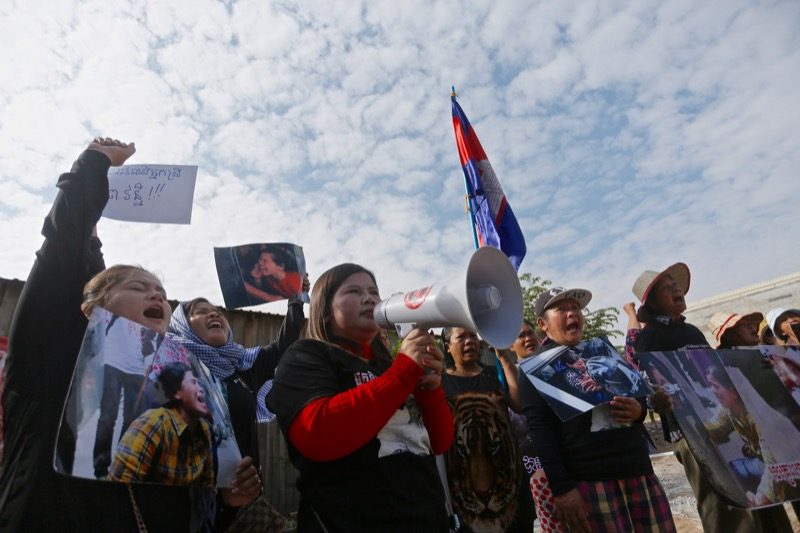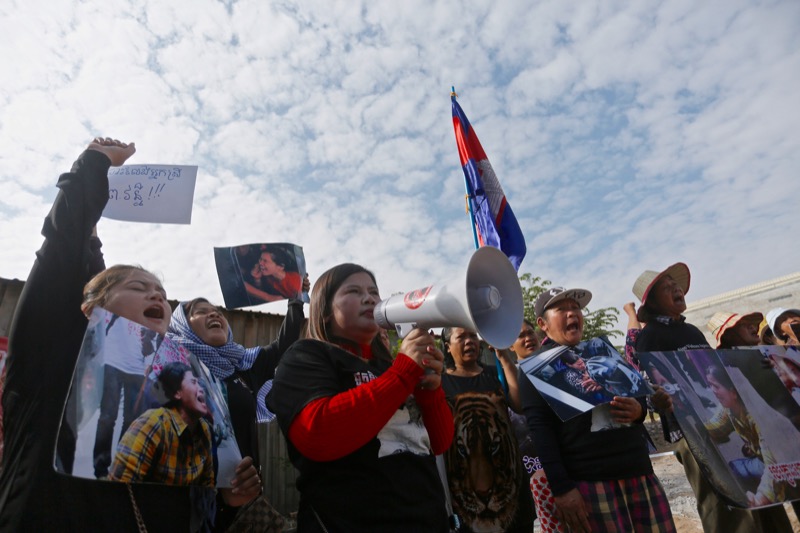Two “Black Monday” protesters were arrested on Monday for the first time since activist Tep Vanny was thrown in jail in August, while an official again warned of the dangers that the long-running campaign would lead to a “color revolution.”
The pair were released about 12 hours later, after promising to cease their campaigning.

Roughly a dozen activists gathered in Phnom Penh’s eviction-hit Borei Keila neighborhood at about 8 a.m., carrying placards calling for the release of alleged political prisoners including Ms. Vanny and election official Ny Chakrya.
Within minutes, about 15 police officers and Prampi Makara district guards broke up the protest, which already seemed to be winding down, and dragged activists Sar Sorn and Nat Sreynak into a police car.
“This morning we were arrested at about 8 a.m.,” Ms. Sorn said from the district police station. “They just came and arrested us without discussing anything.”
Ms. Sorn claimed she was visited by her village chief on Sunday night and warned against wearing a black T-shirt the next day.
“The village chief told me last night that I cannot wear a black shirt, as this shirt represents the Black Monday campaign,” she said.
“If we take it off, where will the Black Monday campaign be?” she asked. “I think it’s only a shirt. What law says it’s wrong?”
Ms. Sreynak, also speaking by telephone while in police detention, said she was targeted while peacefully protesting in her neighborhood.
“Before they arrested me, I was holding a banner in front of my house,” she said, adding that she was also wearing a black shirt, which was not banned under any law of which she was aware. “They told me that I was doing wrong and then they took me into the car.”
Ms. Sorn said that she and Ms. Sreynak were released at about 7:30 p.m. after signing a document saying they would no longer take part in Black Monday protests.
City Hall spokesman Met Measpheakdey said authorities were compelled to arrest the women out of fear that their small protest might turn into a “color revolution”—a term widely understood to mean a peaceful movement for change in government.
“Our authorities needed to arrest them because they stubbornly held the Black Monday campaign,” the spokesman said. “Our government has explained that Black Monday can turn into a color revolution as well.”
The campaign started in May in response to the jailing of four officers from rights group Adhoc and Mr. Chakrya, who previously worked with the organization, allegedly for colluding to cover up a sex scandal involving opposition leader Kem Sokha. The case has been widely derided as politically motivated, and the U.N. has deemed their detention arbitrary.
The peaceful protests have been met with heavy-handed responses from the start. As arrests became a regular feature of the protests, the NGOs that organized the campaign stopped taking to the streets, leaving the Boeng Kak and Borei Keila communities largely on their own.
The protests have ebbed and flowed as the courts have jailed, questioned and convicted activists over the past 11 months.It had been three weeks since the last Black Monday protest.
Rights group Licadho, in its own report on Monday’s arrests, said they had recorded “at least 38 arbitrary arrests of Black Monday participants, who have mostly been detained for hours before being released without charge.”
Ms. Sorn has now been arrested five times for taking part in the campaign, and Ms. Sreynak twice, Licadho added.




